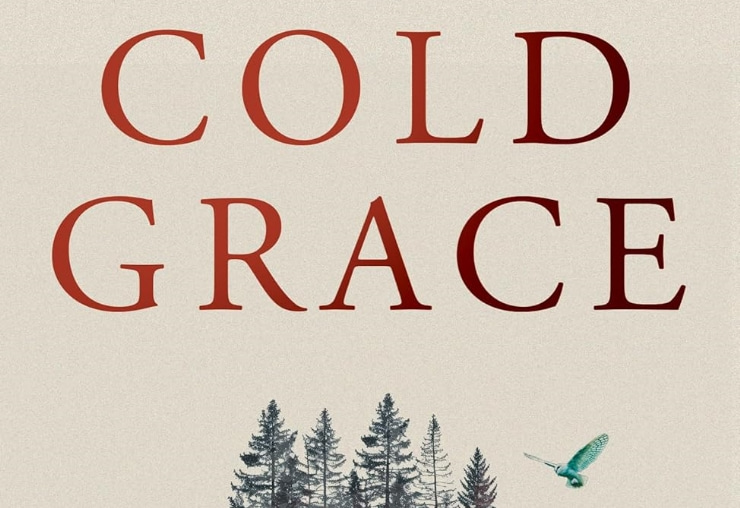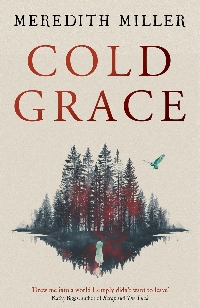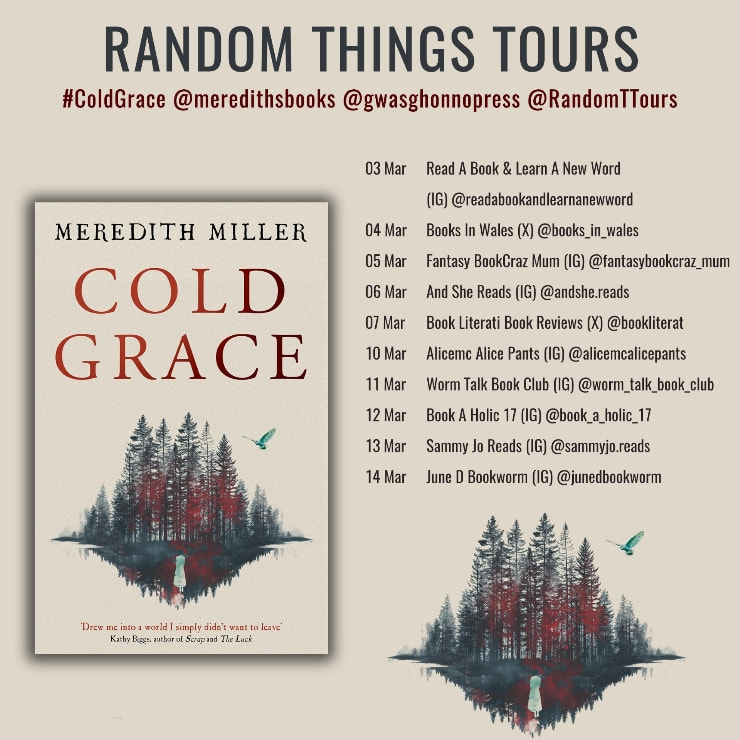Blog tour: Cold Grace by Meredith Miller

This post is part of a blog tour organised by Random Things Blog Tours. I received a free copy of the book in return for an honest review.
‘Winter closes in on a valley in northern New England where a violent history is about to repeat itself.
‘The Allen family farm is nearly empty. Only Eddie, the youngest son, remains, living with his family’s ghosts near the woods he loves. In those woods he meets Jeanne Delaney, a girl he’s known all his life, now turning into a woman.
‘This is not the first time that Eddie’s people have come into contact with Jeanne’s, though. Their families are already tied together by a violent past.
‘For readers of Where the Crawdads Sing, Cold Grace is a dark historical novel defined by its frozen landscape. Both revenge tragedy and coming of age story, it tells of an isolated community haunted by the ghost of its own violence.’

In Cold Grace, by Meredith Miller, senior Jeanne Delaney shares her recollections of life in New England in winter 1913, when she turned 16.
Jeanne is of Gypsy/Boater descent, and as a child, she spent the warm months living on the water with her grandfather and her brother T-Roy (her mother having died in childbirth), and winters on land with Jerusha – the local midwife, and a close friend of her mother – and Jerusha’s intellectually disabled daughter, Etta Grace.
By 1913, though, Etta Grace is conspicuous by her absence, and Jeanne is coming into her power and becoming curious about matters her community have protected her from. She falls in love for the first time, with Eddie Allen – the youngest son of a white colonial farming family.
While Eddie comes across as a decent person, his currently-absent brothers Hank and Micky are known for their violent ways and abuse of girls they consider “inferior” – including Etta Grace. For this reason, Jerusha discourages strong-willed Jeanne’s liaison with the younger Allen, and a showdown beckons when the elder siblings return and confront Eddie about his relationship with Jeanne.
Cold Grace is a book that cuts deep. Everything about it is so intensely alive – from Jeanne’s virtually fearless, grab-life-with-both-hands personality, to the author’s rich, multi-sensory descriptions of subsistence in the harsh climate of a New England winter in the early twentieth century, to the details of Hank and Micky’s shocking behaviour, and how this was taught to them by their late father, Everett, and condoned by their twisted mother, Julia.
Even though it took me a little time to straighten out the family trees/links between characters in my head, I nonetheless became highly engrossed not only in Jeanne’s story, but the chapters that follow Jerusha and T-Roy, which provide important additional information about Jeanne’s backstory, as well as their own experiences – with the Allen family or otherwise – before and during 1913.
There are a few themes that really stood out to me. One, which I can’t say too much about without spoilers, is the inhumane treatment of GTRSB, Native American, and disabled people during this period. The Allens are far from the only ones who look down on/actively discriminate against Jeanne’s community.
Another is the way siblings who grew up in the same household can turn out completely different, due to factors such as birth order, unequal treatment from parents, and particular circumstances at certain ages.
Eddie is a “runt” and “afterthought”, and right from his birth, Julia favours her more robust, less gentle older sons. As Everett died when Eddie was a toddler, Eddie didn’t receive the same inculcation in violence as Hank and Micky, and his siblings’ attempt to teach him in Everett’s stead didn’t take, perhaps because Eddie was simply more peaceful by nature, or a bonded pair of older siblings make less effective teachers than a fearsome patriarch.
Either way, the Allens’ story shows that it’s not inevitable that an abused child will become an abuser themselves, and while Everett’s methods may explain why Hank and Micky are the way they are, they don’t excuse it.
A related theme is toxic masculinity, and how this can be enforced by both men and women. This is particularly exemplified in Julia’s case: she set her sights on Everett after seeing him beat a man with a broken piece of railing, and consistently favours whichever son is the most willing to resort to violence to defend the family and provide for her in her old age.
Julia’s internalised misogyny is such that not only did she let her elder sons abuse young women on her watch, but she deplores and victim-blames women who provoke their husbands by ‘whining’ – she avoided her late husband’s wrath by keeping quiet and still, and just saw this as part of her work as a homemaker.
Something else that caught my attention was the fact that Jeanne is telling her story for an oral history project. Having engaged with oral history myself, it’s believeable that, given the opportunity and encouragement to talk at length at a life stage when she’s reviewing her memories, she divulges the things she does to a stranger. I also thought she made a very good point that her recording would likely end up being lost to history once the project’s funding ran out.
Cold Grace is rich, evocative, and striking.
